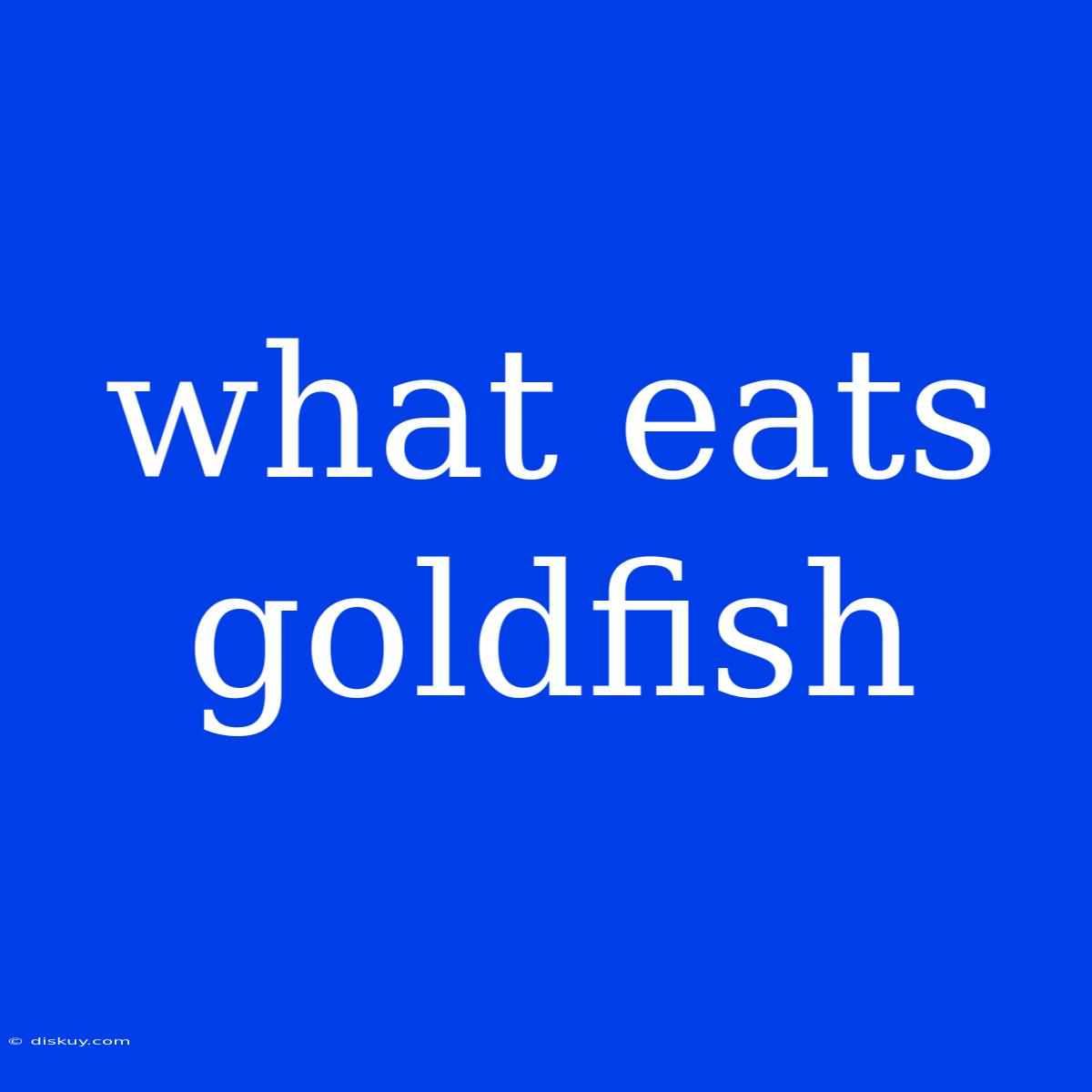What Eats Goldfish? Unveiling the Predators of These Tiny Fish
What eats goldfish? This seemingly simple question delves into a fascinating world of predator-prey relationships, revealing the intricate balance of nature. Goldfish, though often viewed as cute and harmless, are prey animals, and their survival depends on avoiding those that want to make them a meal.
Editor Note: This article explores the diverse range of creatures that prey on goldfish, providing valuable insights for both fish keepers and those interested in the natural world. Understanding these predators is crucial for promoting goldfish health and appreciating their role in the ecosystem.
This topic is important to read because knowledge about goldfish predators helps both aquarists and those in natural settings to provide the best possible care for these fish. This understanding can also aid in identifying potential threats and implementing strategies for protection.
Our analysis delves into the various types of predators, the environments where they reside, and the strategies they utilize to hunt goldfish. This information is compiled from scientific studies, field observations, and expert opinions, offering a comprehensive review of the topic.
Key Takeaways of Goldfish Predators:
| Predator Type | Environment | Hunting Strategy |
|---|---|---|
| Larger Fish | Freshwater | Ambush hunting, chasing, and swallowing whole |
| Birds | Near Water | Diving and snatching from the surface |
| Mammals | Near Water | Foraging and snatching from shallow water |
| Insects and Amphibians | Freshwater | Catching larvae, young, or weakened goldfish |
Goldfish Predators
Larger Fish
Larger fish pose a significant threat to goldfish, particularly in natural settings. Bass, pike, catfish, and even some larger goldfish species can readily consume their smaller counterparts. These predators employ a variety of hunting strategies:
Ambush Hunting: These predators remain concealed, waiting for goldfish to come within striking distance before launching a quick attack.
Chasing: Predator fish use their speed and agility to chase down goldfish, often cornering them in a shallow area.
Swallowing Whole: Larger predators typically swallow their prey whole, using their powerful jaws to subdue and engulf goldfish.
Birds
A variety of birds, including herons, egrets, gulls, and kingfishers, prey on goldfish. These predators are adapted to foraging in aquatic environments, using their keen eyesight and sharp beaks to hunt.
Diving and Snatching: Birds often dive into the water, using their beaks to snatch goldfish from the surface or shallows.
Perched Observation: Some birds perch near water bodies, patiently waiting for goldfish to come within reach.
Mammals
While not as common as fish and birds, some mammals, such as raccoons, otters, and mink, can prey on goldfish, especially in shallow water or near the shoreline. These animals often rely on their sharp claws and teeth to catch and consume their prey.
Foraging and Snatching: Mammals typically forage in the water's edge, using their claws and teeth to capture goldfish.
Shallow Water Hunting: Mammals often focus their hunting efforts in shallow water, where goldfish are more vulnerable.
Insects and Amphibians
While not primary predators, insects and amphibians can pose a threat to goldfish larvae and juveniles. Dragonflies, frogs, and newts may prey on smaller goldfish, contributing to natural population control.
Catching Larvae and Young: These creatures often target vulnerable goldfish larvae and young, using their agile movements and sticky tongues to catch prey.
Weakened Goldfish: Insects and amphibians may also prey on weakened goldfish, further contributing to natural selection.
Understanding the Predator-Prey Relationship
The predator-prey relationship between goldfish and these various creatures is crucial for maintaining ecological balance. Goldfish serve as a food source for other species, contributing to their survival and regulating their population growth. Predators, in turn, help control goldfish populations, preventing overgrazing of aquatic vegetation and ensuring the health of the ecosystem.
FAQ on Goldfish Predators
Q: Are goldfish safe in ponds with large fish? A: It is not recommended to keep goldfish in ponds with large fish species that are known predators.
Q: Can goldfish be kept with other fish species? A: Yes, but care must be taken to select compatible species, considering size and temperament.
Q: What can I do to protect goldfish from predators in my pond? A: You can consider installing protective netting or barriers, adding plants for hiding, or ensuring adequate water depth to deter predators.
Q: How do predators affect goldfish populations in the wild? **A: ** Predators help regulate goldfish populations, preventing overgrazing and maintaining the ecological balance of aquatic environments.
Q: Is it ethical to keep goldfish in captivity? A: While ethical considerations vary, providing adequate space, care, and a healthy environment is essential for captive goldfish.
Tips for Protecting Goldfish from Predators
- Choose a predator-resistant pond: Select a pond with deep water, limited access, and natural barriers like dense vegetation.
- Create hiding spaces: Provide plenty of plants, rocks, and structures for goldfish to hide and feel secure.
- Use predator-proof netting: Install netting over the pond's surface to deter birds and other aerial predators.
- Monitor for predator activity: Keep an eye out for any signs of predators in or near the pond, such as tracks or droppings.
- Consider stocking with compatible fish: Introduce species that are known to deter predators or compete with them for food.
Summary of Goldfish Predators
This exploration has revealed the diverse range of creatures that prey on goldfish, from larger fish to birds and mammals. Understanding these predators is crucial for responsible fishkeeping and appreciating the intricate balance of nature. By protecting goldfish from their natural enemies, we can ensure their survival and promote a healthy ecosystem.
Closing Message
The world of goldfish predators is an intricate and fascinating one. It reminds us that even seemingly small and harmless creatures play a significant role in the natural world. Through careful observation and understanding of these predator-prey relationships, we can better appreciate the beauty and complexity of the environment around us.

